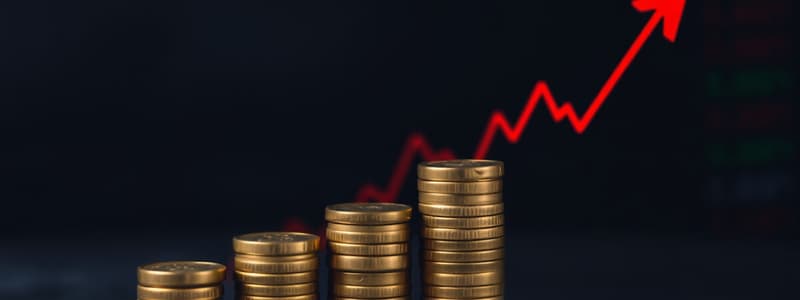Podcast
Questions and Answers
What is the primary focus of the indirect investment process?
What is the primary focus of the indirect investment process?
- Acquiring physical goods for trade
- Investing directly in real estate assets
- Purchasing representational items like stocks or bonds (correct)
- Investing in commodities and derivatives
Which characteristic of capital refers to its ability to adapt to different environments?
Which characteristic of capital refers to its ability to adapt to different environments?
- Mobility
- Sensitivity (correct)
- Scarcity
- Stability
What is a significant factor influencing the flow of capital according to country risk evaluation?
What is a significant factor influencing the flow of capital according to country risk evaluation?
- Cultural heritage
- Political stability (correct)
- Population density
- Level of education
In evaluating country risk, which economic aspect is NOT commonly assessed?
In evaluating country risk, which economic aspect is NOT commonly assessed?
What aspect does monetary policy primarily focus on?
What aspect does monetary policy primarily focus on?
Which of the following describes the role of an investment advisor in indirect investment?
Which of the following describes the role of an investment advisor in indirect investment?
Favorable conditions for capital investment include all of the following EXCEPT:
Favorable conditions for capital investment include all of the following EXCEPT:
Which of the following best describes 'scarcity' in the context of capital characteristics?
Which of the following best describes 'scarcity' in the context of capital characteristics?
How does fiscal policy influence investors' decisions?
How does fiscal policy influence investors' decisions?
What is the main feature of fixed-income securities?
What is the main feature of fixed-income securities?
What distinguishes equity securities from fixed-income securities?
What distinguishes equity securities from fixed-income securities?
Which of the following is true regarding derivatives?
Which of the following is true regarding derivatives?
What could be considered an example of a fixed-income security?
What could be considered an example of a fixed-income security?
Which financial instrument is best associated with capital gains from increases in company value?
Which financial instrument is best associated with capital gains from increases in company value?
In which category do options and forwards fall under?
In which category do options and forwards fall under?
What differentiates preferred shares from common stock?
What differentiates preferred shares from common stock?
Which of the following statements is incorrect regarding fixed-income securities?
Which of the following statements is incorrect regarding fixed-income securities?
Who are the primary investors for derivatives?
Who are the primary investors for derivatives?
What is true about both equity securities and fixed-income securities?
What is true about both equity securities and fixed-income securities?
What characteristic of the unlisted equity market distinguishes it from stock exchanges?
What characteristic of the unlisted equity market distinguishes it from stock exchanges?
How do market makers operate in the unlisted equity market?
How do market makers operate in the unlisted equity market?
Which statement about the unlisted equity market is accurate?
Which statement about the unlisted equity market is accurate?
What is a primary reason some companies trade OTC instead of on exchanges?
What is a primary reason some companies trade OTC instead of on exchanges?
What role do investment dealers play in the unlisted equity market?
What role do investment dealers play in the unlisted equity market?
Which of the following is NOT a feature of the unlisted equity market?
Which of the following is NOT a feature of the unlisted equity market?
What characterizes a liquid market?
What characterizes a liquid market?
Which of the following securities is primarily traded on the Toronto Stock Exchange?
Which of the following securities is primarily traded on the Toronto Stock Exchange?
What is the primary function of the Montréal Exchange?
What is the primary function of the Montréal Exchange?
Which of the following statements about the TSX Venture Exchange is incorrect?
Which of the following statements about the TSX Venture Exchange is incorrect?
Which exchange provides services for trading natural gas and electricity markets?
Which exchange provides services for trading natural gas and electricity markets?
What type of financial instruments are traded on Canadian exchanges?
What type of financial instruments are traded on Canadian exchanges?
The characteristic of having small price fluctuations between trades is indicative of what?
The characteristic of having small price fluctuations between trades is indicative of what?
Which of the following exchanges offers trading in agricultural futures?
Which of the following exchanges offers trading in agricultural futures?
What type of securities does the Canadian Securities Exchange primarily list?
What type of securities does the Canadian Securities Exchange primarily list?
Which of the following is NOT a characteristic of a liquid market?
Which of the following is NOT a characteristic of a liquid market?
What is the significance of a bid-ask spread in trading?
What is the significance of a bid-ask spread in trading?
Which of the following statements accurately describes the ask price?
Which of the following statements accurately describes the ask price?
In the context of trading, what happens when a bid matches an offer?
In the context of trading, what happens when a bid matches an offer?
After executing a trade at the last price, what are the new best bid and ask prices?
After executing a trade at the last price, what are the new best bid and ask prices?
If the last price of a stock is $5.06, which of the following can be true?
If the last price of a stock is $5.06, which of the following can be true?
When three bids of $5.00, $5.03, and $5.06 are placed, which bid executes a trade if the ask prices are $5.06, $5.07, and $5.11?
When three bids of $5.00, $5.03, and $5.06 are placed, which bid executes a trade if the ask prices are $5.06, $5.07, and $5.11?
What will happen to the bid-ask spread if the best ask price increases while the best bid remains unchanged?
What will happen to the bid-ask spread if the best ask price increases while the best bid remains unchanged?
Why may the last price of a stock not reflect its current buying or selling price?
Why may the last price of a stock not reflect its current buying or selling price?
What is typically true about the market when the best bid is lower than the best offer?
What is typically true about the market when the best bid is lower than the best offer?
Flashcards are hidden until you start studying
Study Notes
Indirect Investment Process
- Indirect investment involves purchasing representative items, such as stocks and bonds, rather than directly investing in assets.
- Investors buy securities issued by governments or corporations, who then invest the funds for productive purposes.
- Often facilitated by investment advisors in retail or institutional sales departments of securities firms.
Characteristics of Capital
- Capital is characterized by mobility, environmental sensitivity, and scarcity.
- These traits allow capital to be selective, favoring locations with stable governments, unregulated economic activities, hospitable climates, and profitable opportunities.
- Country risk evaluations guide capital flow, assessing both internal and external conflicts, economic strengths, fiscal policies, and monetary stability.
Factors in Country Risk Evaluation
- Political Environment: Examines potential internal or external conflicts within a country.
- Economic Trends: Looks at growth in GDP, inflation rate, and overall economic activity.
- Fiscal Policy: Considers tax levels and government spending, and the encouragement of savings and investments.
- Monetary Policy: Assesses the management of the money supply and its impact on price and foreign exchange stability.
Types of Financial Instruments
- Fixed-Income Securities: Formal agreements where issuers repay loans at maturity, with interest payments in the interim (e.g., Treasury bills, bonds).
- Equity Securities: Represent ownership in a company; value increases lead to capital gains upon selling (e.g., common and preferred shares).
- Derivatives: Financial contracts with values derived from underlying instruments like stocks or indices; suited for sophisticated investors (e.g., options, forwards).
Understanding the Bid-Ask Spread
- The bid price reflects the highest a buyer is willing to pay; the ask price is the lowest a seller will accept.
- The difference between ask and bid prices is known as the bid-ask spread.
- Last price is simply the latest executed trade price, which can vary between the bid and ask prices.
Stock Exchanges Overview
- Stock exchanges are auction markets for buyers and sellers of securities, facilitating pricing based on supply and demand.
- Canadian exchanges trade a variety of financial instruments including equities, rights, warrants, and ETFs.
Major Stock Exchanges in Canada
- Toronto Stock Exchange (TSX): Lists equities, some convertible debt instruments, income trusts, and ETFs.
- TSX Venture Exchange: Primarily lists equities and a limited number of debentures.
- Montréal Exchange: Trades all financial futures and options in Canada.
- Natural Gas Exchange: Facilitates electronic trading in North American natural gas and electricity markets.
- Canadian Securities Exchange: Focuses on equities of emerging companies.
Liquidity in Markets
- A liquid market has frequent trades, narrow bid-ask spreads, and small price fluctuations, essential for efficient trading.
Unlisted Equity Market Insights
- The unlisted equity market has a smaller volume than stock exchanges, with many junior issues trading over-the-counter (OTC).
- OTC market trading lacks minimum listing requirements, often resulting in more speculative stocks with lower liquidity.
Trading in the Unlisted Equity Market
- OTC trading in equities resembles bond trading, with investment dealers acting as market makers by quoting their own bids and offers.
- Market makers maintain inventory of securities, providing liquidity even though they may refuse trades at quoted prices.
Studying That Suits You
Use AI to generate personalized quizzes and flashcards to suit your learning preferences.




